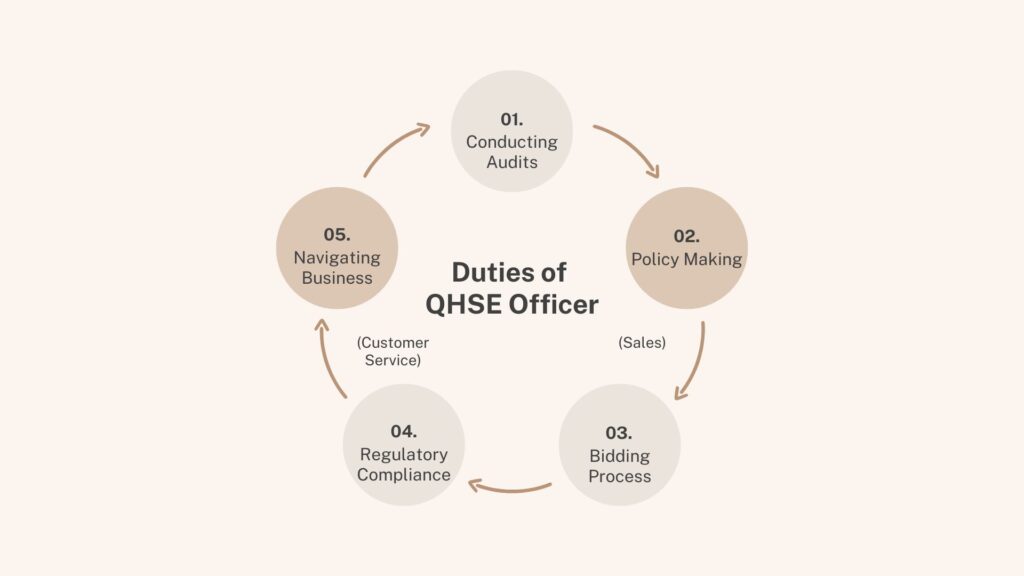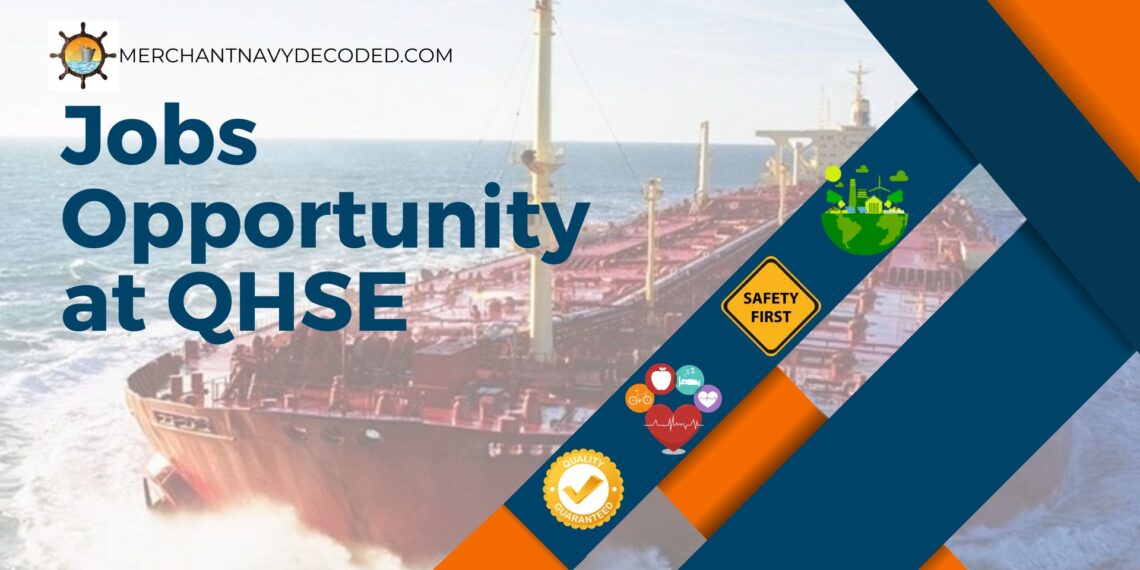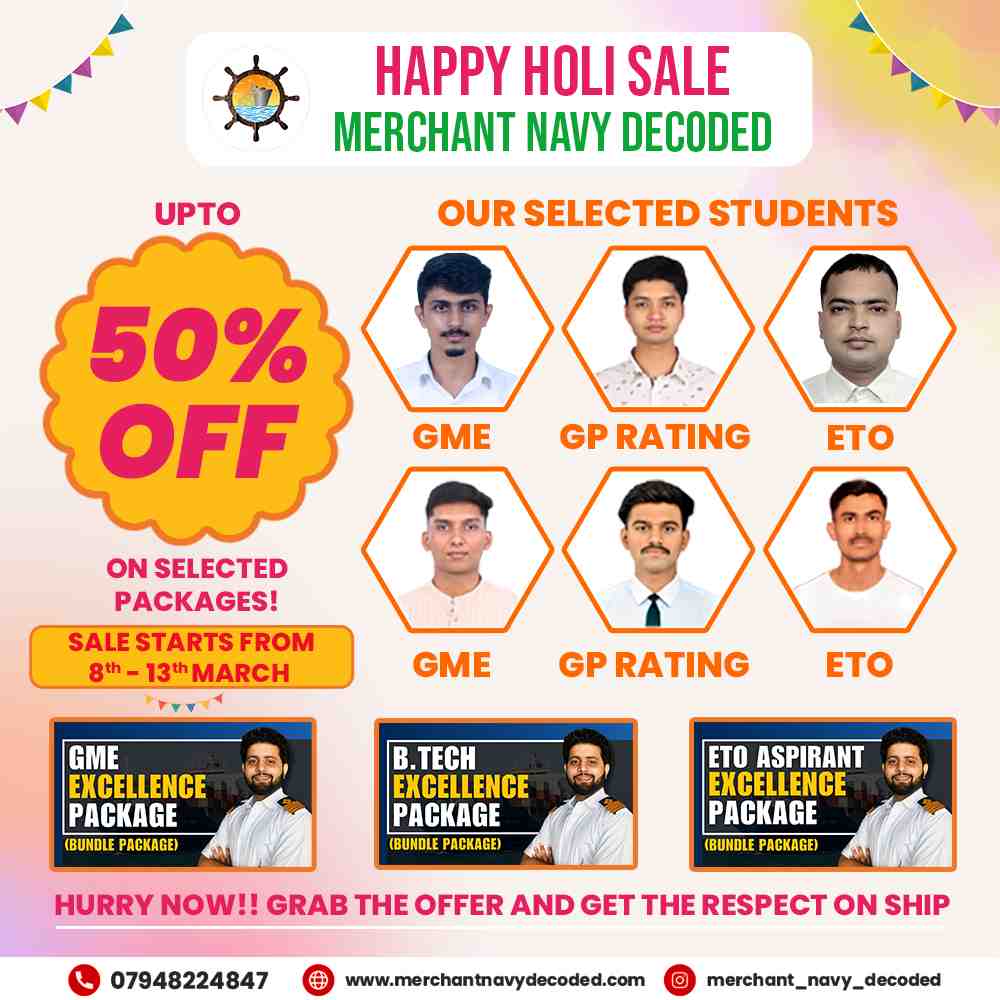Job Opportunities in QHSE For Deck Officers
1:- What is QHSE?
QHSE stands for Quality, Health, Safety, and Environment. It represents an integrated management approach that emphasizes the importance of ensuring high standards in these four key areas within an organization.
1.1:- Quality (Q)
- Definition: Quality in the context of QHSE refers to meeting or exceeding the expectations and requirements set by customers, stakeholders, and regulatory bodies.
- Objective: Ensuring products, services, and processes are of the highest standard to satisfy customers, enhance reputation, and comply with industry norms.
1.2:- Health (H)
- Definition: Health focuses on the well-being of employees, contractors, and other stakeholders within the organization.
- Objective: Creating a work environment that promotes physical and mental health, preventing occupational illnesses and injuries, and complying with health regulations.
1.3:- Safety (S):
- Definition: Safety involves protecting individuals from harm, accidents, and hazards in the workplace.
- Objective: Establishing and maintaining a safe working environment, implementing safety protocols, and adhering to industry safety standards and regulations.
1.4:- Environment (E):
- Definition: Environment pertains to minimizing the impact of an organization’s activities on the natural surroundings.
- Objective: Promoting sustainable practices, reducing environmental footprint, complying with environmental laws, and fostering a commitment to ecological responsibility.
2:- Key Principles of QHSE
- Integration: QHSE is an integrated management system, that acknowledges the interdependence of quality, health, safety, and environmental aspects. It seeks to align these areas for a cohesive and effective approach to overall organizational performance.
- Continuous Improvement: QHSE emphasizes a culture of continuous improvement. Regular assessment, monitoring, and adaptation of processes are undertaken to enhance performance and meet evolving standards.
- Risk Management: Identifying and managing risks is crucial in QHSE. Organizations proactively assess potential hazards, vulnerabilities, and compliance issues to prevent incidents and improve overall resilience.
- Compliance: Adhering to relevant laws, regulations, and industry standards is a fundamental aspect of QHSE. Organizations strive to meet and exceed these requirements to demonstrate responsibility and accountability.
- Employee Involvement: QHSE encourages the active participation and engagement of employees at all levels. This involvement promotes a shared responsibility for quality, health, safety, and environmental goals.
3:- Jobs Opportunities in QHSE
If you want to learn more about the opportunities in Shore jobs for seafarers then you should check out our free Ship to Shore Guidance Series for Seafarers.
3.1:- Rich Experience Advantage:
- Masters, having served in the highest operational capacity on vessels, brings a wealth of hands-on experience and a deep understanding of maritime operations. This experience is highly valued in onshore roles.
3.2:- Strategic Leadership Roles:
- Transitioning from onboard operational roles, masters are often sought after for strategic leadership positions. They are well-equipped to manage teams and navigate complex challenges, making them ideal candidates for managerial roles ashore.
3.3:- Industry Recognition:
- Masters command a high level of respect within the maritime industry. Their expertise is recognized not only for operational efficiency but also for their ability to uphold safety standards and compliance, making them key players in onshore responsibilities.
3.4:- Cross-Functional Opportunities:
- Masters can explore diverse sectors within the maritime industry and beyond. Their skills are transferable to various domains, offering a broader range of opportunities in areas such as logistics, consulting, and maritime policy advocacy.
4:- Duties in QHSE

4.1:- Conducting Audits:
- QHSE roles for masters often involve conducting thorough audits to assess and improve safety and quality standards. Their firsthand experience enables them to identify potential risks and implement effective preventive measures.
4.2:- Contributing to Policy-Making:
- Masters play a pivotal role in shaping organizational policies related to safety, quality, and environmental standards. Their operational insights contribute to the formulation of robust policies that align with industry regulations and best practices.
4.3:- Participating in Bidding Processes:
- In the onshore realm, masters can actively participate in bidding processes for projects. Their understanding of operational intricacies allows them to contribute valuable insights, enhancing the competitiveness of bids and securing contracts.
4.4:- Ensuring Regulatory Compliance:
- Masters in QHSE roles oversee the alignment of policies and practices with international maritime regulations such as MARPOL and SOLAS. They play a critical role in ensuring that the organization complies with all necessary standards and guidelines.
4.5:- Navigating Business Challenges:
- Masters bring a unique perspective to onshore roles by applying their operational knowledge to address challenges in policy implementation, risk management, and compliance. This capability is particularly valuable in dynamic and evolving maritime environments.
5:- Skills Required for QHSE
5.1:- Understanding MARPOL and SOLAS
- Individuals entering QHSE roles must possess in-depth knowledge of maritime regulations such as MARPOL (Marine Pollution) and SOLAS (Safety of Life at Sea). This expertise ensures adherence to international standards, preventing environmental harm and enhancing overall safety.
5.2:- Safety Checklists and Attention to Detail:
- Safety experts in QHSE diligently use checklists to systematically assess and verify compliance with safety protocols. Attention to detail is crucial, as it helps identify potential hazards, ensuring that safety measures are not overlooked and contributing to the prevention of accidents.
5.3:- Risk Assessment Skills:
- Proficiency in risk assessment is a key component of safety expertise. Individuals in QHSE roles need to evaluate potential risks associated with various operations, identify preventive measures, and implement strategies to mitigate risks effectively.
5.4:- Incident Investigation Capability:
- Safety experts should be skilled in conducting thorough investigations in the event of incidents or accidents. This involves analyzing root causes, identifying areas for improvement, and implementing corrective actions to prevent similar occurrences.
5.5:- Communication Skills:
- Clear and effective communication is vital for safety experts. They must convey safety procedures, regulations, and expectations to diverse audiences within the organization, fostering a culture of safety awareness and compliance.
6:- Salary in QHSE for Operational Level Officers
- Operational-level officers entering QHSE roles can expect a starting salary ranging from 8 to 11 Lakhs Per Annum (LPA). This baseline compensation reflects their expertise in operational aspects and their contribution to maintaining safety and compliance standards.
- Salary growth may also be influenced by the industry sector and the size of the employing company. For instance, those working in high-risk industries or growing organizations may experience more substantial increases in compensation.
7:- Salary in QHSE for Management Level Officers
- The management level officers in QHSE roles command a higher salary bracket, ranging from 36 to 48 Lakhs Per Annum.
- Management-level officers also benefit from additional career advancement opportunities, including the potential for promotions to higher managerial roles.
8:- How to apply for QHSE?
8.1:- Shipping Companies:
- International and National Operators: Apply to both international and national shipping companies, as each may offer different opportunities for career growth.
- Specialized Vessels: Depending on your interests and expertise, target companies that operate specialized vessels such as container ships, oil tankers, LNG carriers, cruise liners, or offshore support vessels.
8.2:- Maritime Consultancies and Services:
- Consulting Firms: Maritime consulting firms may require professionals with expertise in vessel routing. Explore opportunities to work with these firms, offering your skills in route planning, navigation, and technology.
- Safety and Compliance Services: Companies providing services related to maritime safety and compliance may have roles suitable for professionals with a strong background in vessel routing.
8.3:- Online Job Platforms:
- Maritime Job Websites: Regularly check and apply through dedicated maritime job platforms. Ensure that your profile on these platforms is complete and showcases your qualifications and experience.
- General Job Portals: Some general job portals also feature maritime and shipping industry positions. Keep an eye on platforms like Indeed, Naukri, or Monster for relevant openings.
8.4:- Professional Associations:
- Join Maritime Associations: Become a member of maritime professional associations or societies. These organizations often provide job boards, industry insights, and networking opportunities that can be valuable in your job search.
- Local and International Associations: Explore both local and international associations to broaden your job search scope.
9:- Conclusion
In conclusion, the blog has uncovered a promising horizon for deck officers eyeing a transition to Quality, Health, Safety, and Environment (QHSE) roles. From the wider scope offered to experienced masters to the imperative skills of safety mastery, the journey to QHSE is illuminated.
Disclaimer :- The opinions expressed in this article belong solely to the author and may not necessarily reflect those of Merchant Navy Decoded. We cannot guarantee the accuracy of the information provided and disclaim any responsibility for it. Data and visuals used are sourced from publicly available information and may not be authenticated by any regulatory body. Reviews and comments appearing on our blogs represent the opinions of individuals and do not necessarily reflect the views of Merchant Navy Decoded. We are not responsible for any loss or damage resulting from reliance on these reviews or comments.
Reproduction, copying, sharing, or use of the article or images in any form is strictly prohibited without prior permission from both the author and Merchant Navy Decoded.




